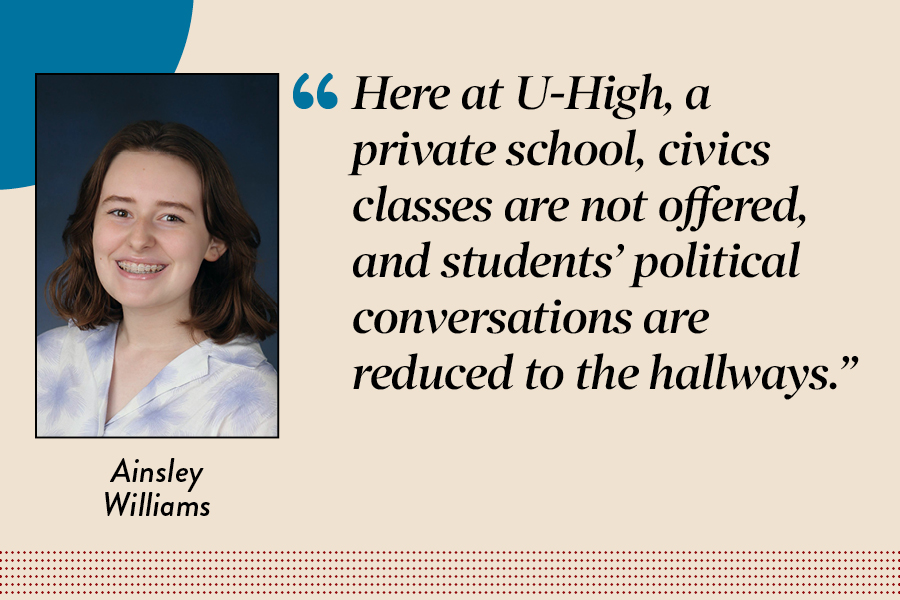Mandatory civics classes promote political literacy, diversity
Midway Staff
School usually provides us with the resources needed to prepare us for college and a career after high school. Yet, it is equally important for students to be educated on how to actively participate in our democracy.
February 9, 2023
A typical classroom: a teacher at the front, students at their desks. The lessons cover the ins and outs of government from elections to laws to who is affected by those laws, and in the process, they educate the next generation of voters, political thinkers and leaders. This is a typical civics class.
In 2015, former Illinois Gov. Bruce Rauner signed House Bill (HB) 4025 into law requiring all Illinois public school students to take at least one semester of civics to graduate. The bill says that these classes will help “young people acquire and learn to use the skills, knowledge and attitudes that will prepare them to be competent and responsible citizens throughout their lives.”
Yet here at U-High, a private school, civics classes are not offered, and students’ political conversations are reduced to the hallways.
U-High should incorporate mandatory civics classes into the curriculum to further educate students on government and citizenship.
School usually provides us with the resources needed to prepare us for college and a career after high school. Yet, it is equally important for students to be educated on how to actively participate in our democracy. A study by the Cambridge University Press shows that high schoolers who have completed a civics class are more likely to vote in local elections, like mayoral and aldermanic elections, and federal elections, like president, members of Congress and Senate. This is especially important because in order for a political body to be truly representative, all members of society must be included.
A U-High one-semester civics class could be implemented within the history department. The lessons would include not just paper writing and lectures but also large-group discussions to encourage political conversation.
A standard civics class will cover civil law and civil codes but also media and political literacy, which teaches students to analyze and understand different types of media and political topics.
This is especially important at a time where misinformation, or the spreading of incorrect or misleading information is at an all-time high. The lax restrictions on many social media sites like Twitter, Facebook and Instagram create a breeding ground for things like election fraud and vaccine misinformation to thrive.
With civics classes, students don’t just learn about how the government works. They also learn who is most affected by the government and the laws that are passed, like pipeline safety, data privacy and pandemic preparedness, all of which are hot topics in the new Congress.
As a country, our government is more divided than ever. With abortion rights hanging by a thread, a days-long battle for Speaker of the House, the influence of swing states, and a Gen Z member of Congress all prevalent in Washington, now more than ever is the time to dig deeper in understanding how the government works and what it stands for.





























































Kim Mosley (class of '63) • Feb 10, 2023 at 11:21 am
I love your UHighMidway. Such a testament to the education you are getting. Being in education all my life, I saw many arguments how this and that should be required. For me, it would be art and meditation. I think that making a case that something is important is better than making it a mandate. In fact, in Europe, they found that more people would get vaccinated if it wasn’t required. Keep up the great work.